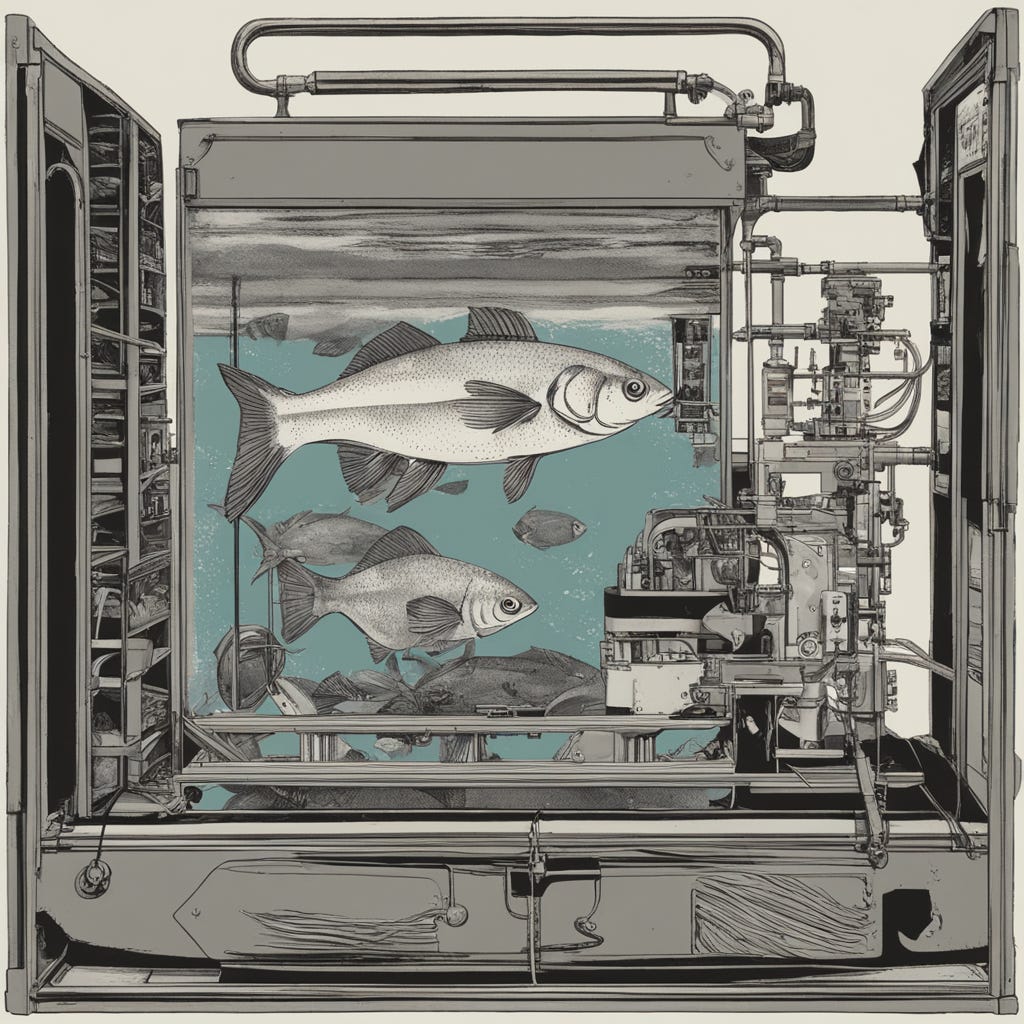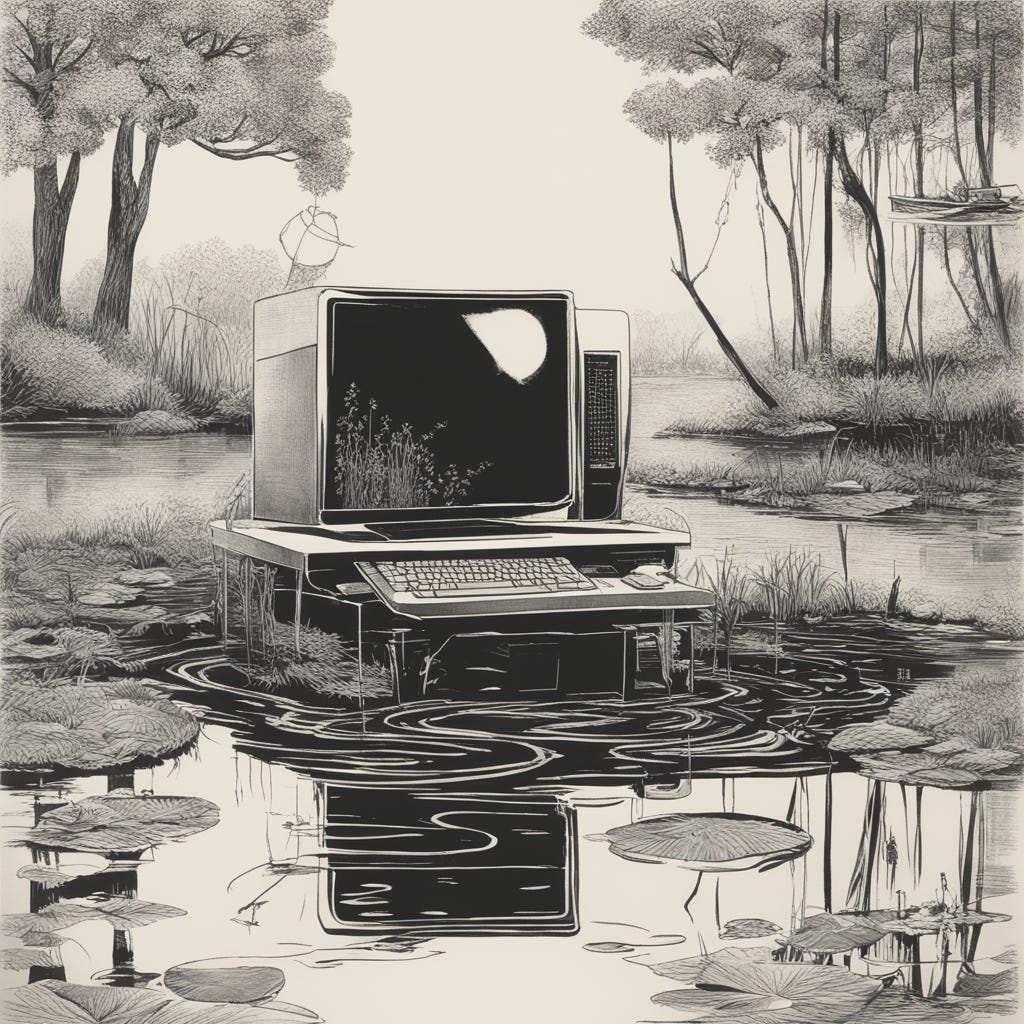Weird fishes in manmade ponds
Collective moral injuries and social media as a barrier to healing
Most people are inherently good, I think, and more often than not make decisions they truly believe are the best for themselves and the people they love at any given inflection point. But decisions are only as sound as the information they are based upon and the clarity of the contexts they are made within.
I’ve always thought offering quality information could inform better decision-making and that maybe one day the world would be a smidge better for it. That moral vision has guided my professional career to date.
Thinking this way causes me to understand many modern social problems — misinformation, threats, and extremism — not as horrible fates inflicted by the “bad guys” against the “good guys” but rather as byproducts of worsening collective social disorders (though there are some real villains in the picture, too).
These disorders often resemble something like moral injury, as a former colleague argued to me at a recent conference. Our faith in the goodness of each other, and even ourselves, wavers and causes us to second-guess the directions of moral compasses. It’s easier to become disoriented, isolated, and distracted in meaningless daily dramas.
A certain amount of disorder is to be expected in any healthy society; it drives a constant refinement of norms and boundaries that can result in positive progress. Moral injuries are also to be expected when those we once looked to for stability or hope betray our values, as they have in the last decade, especially. But I fear we sometimes let our understanding of the world be defined by these contradictions, rather than letting our path forward be guided by them.
When we stand dumbfounded at spectacles, we are ultimately absent from our lives as they meaningfully exist.
Social media is not solely to blame for our social disorders but it is an undoubted accelerant of them. These platforms have trained us to behave like fish in a manmade pond do when food is tossed from a bridge, thrashing upon each other in hopes of scoring a few morsels in an ecosystem we have no control over. We confuse our fellow fish as our obstacles to food, rather than the keepers of the pond who artificially limit our supply.
It is no fault of our own. Corporations knowingly made their social media products addictive and insular, hoping to keep us locked in emotional and reactive states and dependent on their companies for sustenance. It speaks volumes that the world’s ruling class, who stand to benefit from this disorder more than most, and who could do seemingly anything else in the world with their time and money, are hooked on these products, too.
The addictive pathways these products form can extend well past the bevels of our screens and bleed into our personal lives in intrusive and disruptive ways.
Even the best efforts to promote an informed public have to contend with powerful forces like these, which exist beyond any single person’s or organization’s control. People attempting good-faith efforts to enact positive change must also contend with their own roles in the feeding frenzy. Are we just bigger fish churning in the pond, or are we seeking to challenge the systems that put us here to begin with? I sadly think a lot of modern political discourse is stuck in the former camp, though perhaps subconsciously.
For years, my thought was that whether I like it or not, we live in this churning pond now and no one ever won chess by playing checkers. As I’m getting a little bit older and mellowing out generally, I have questioned the wisdom of that thinking.
I would be delusional to think I could beat a casino at its slot machines in any sustainable fashion, and it may also be a farce to think that there’s a chance at finding a jackpot in daily online political arguments. Instead, a better plan would be to reorient my relationship to the casino and be realistic with myself about the costs of engaging with its games. The way you win a slot machine is not by feeding in more tokens, but by leaving the game floor and doing something else.
The victories we might score playing the “discourse” game are pyrrhic.
As for our moral injuries, the answer is less clear. Its not evident to me at what point more information about a situation or topic stops being helpful. Educating oneself to the point of uselessness is a real danger in some cases, and the pursuit of raw knowledge can sometimes obscure the underlying truths that exist beneath infinite nuances and complexities.
A start in the right direction looks like promoting a consciousness of the pond we’ve been suckered into and recognizing our humility. We must have more compassion with each other and ourselves, and commit to a moral vision that accounts for humanity and its imperfections. And perhaps most importantly, we must open our political imagination to a world beyond the pond.
I wonder what kind of fish am I in the pond. Do I hover at the surface waiting for chances to wrestle for scraps from the sky? Or am I swimming with purpose, searching for fresher waters? Does it make a meaningful difference to talk about the pond at all? Am I wasting my words?
Perhaps escape from this pond is not possible, but there might be an amount of peace available to those who are willing to embark on the journey to its edges to find out.
I kept Sufjan Stevens’ 2010 album “The Age of Adz” in the CD player of my car while I was in high school. For months, I started my weekday commute to school with the song album’s first track, “Futile Devices.” I hope you enjoy it as much as I do.
This live version is the best recording of it:
I think of you as my brother
Although that sounds dumb
And words are futile devices
I published this one without an editor. (You might be able to tell.) I guess this means I’m back. If you found value in this, you can subscribe here:






Thought-provoking piece, Jared — thank you. I like the frame of moral injury and the notion of escaping the pond or finding its edges. A question I am holding in my own journey is, how do I to engage in discourse at a higher frequency level?